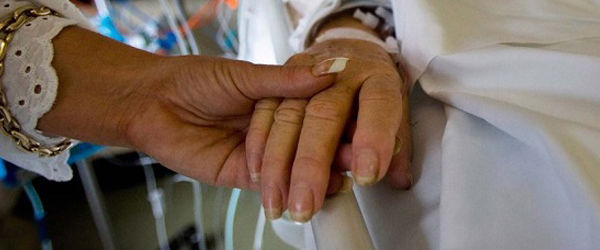There can be no "middle ground" on matters of faith and morals, the bishop who conducted the Vatican-ordered doctrinal assessment of the Leadership Conference of Women Religious said in an interview that aired July 25 on National Public Radio's "Fresh Air" program.Bishop Leonard P. Blair of Toledo, Ohio, one of two U.S. bishops assisting Archbishop J. Peter Sartain of Seattle in providing "review, guidance and approval, where necessary, of the work" of LCWR, was responding to a call for dialogue by Franciscan Sister Pat Farrell, LCWR president, on the same program July 17."If by dialogue they mean that the doctrines of the church are negotiable and the bishops represent one position and the LCWR presents another position, and somehow we find a middle ground about basic church teaching on faith and morals, then no," he said. "I don't think that is the kind of dialogue that the Holy See would envision."But if it's a dialogue about how to have the LCWR really educate and help the sisters to appreciate and accept church teaching and to implement it in their discussions and try to hear some of the questions or concerns they have about these issues, then that would be the dialogue," he added.But the bishop said that "up till now there's been a lot of just denial" by LCWR on the concerns raised by the Vatican.Named in April 2008 to carry out a doctrinal assessment of LCWR, Bishop Blair submitted an eight-page report to the Vatican in July 2010. In April 2012, the Vatican announced a major reform of LCWR, citing "serious doctrinal problems which affect many in consecrated life."The Maryland-based LCWR has about 1,500 leaders of U.S. women's religious communities as members and represents about 80 percent of the country's 57,000 women religious. Its canonical status is granted by the Vatican.The assessment said reform was needed to ensure LCWR's fidelity to Catholic teaching in areas that include abortion, euthanasia, women's ordination and homosexuality.Bishop Blair expressed "great disappointment" at Sister Farrell's comments on abortion in the earlier NPR program. She said the work of U.S. women religious is "very much pro-life," but they would question "any policy that is more pro-fetus than actually pro-life.""You know, if the rights of the unborn trump all the rights of all those who are already born, that is a distortion, too," she said. "There's so much being said about abortion that is often phrased in such extreme and such polarizing terms that (we) choose not to enter into a debate that is so widely covered by other sectors of the Catholic Church — and we have been giving voice to other issues that are less covered, but are equally important."Noting that Blessed John Paul II said "all other human rights are false and illusory if the right to life ... is not defended with maximum determination," Bishop Blair said. "So to kind of relativize or say ... the right to life of an unborn child is a preoccupation with fetuses, or it’s relative in its importance, I can't agree with that."And I don't think that represents the church's teaching and the focus of our energies in trying to deal with this great moral issue," he added.Asked whether he thought it was hypocritical for the bishops to be "cracking down" on LCWR in light of their own failures in the area of clergy sexual abuse, Bishop Blair said, "I think that the sexual abuse scandal is a great shadow over the church and over the hierarchy that we have to live with. But we also have to keep going on as a church with integrity.""I don't think you or anyone would suggest that because there is this scandal and because there were tremendous failures and we have to live with that and try to make reparation for it, that doesn't mean that the Catholic Church now is somehow going to cease to exist or that the bishops can no longer exercise their responsibility for being teachers of the faith, for proclaiming the Gospel, for celebrating the sacraments, for speaking to the world about Christ," he said.He also disputed that the Vatican action was a crackdown, saying it is "meant to be an effort to work with (women religious) to have them enter into dialogue with us in order to remedy what we feel are serious doctrinal concerns."Bishop Blair said the Catholic Church does not ordain women to the priesthood "because women are somehow unfit to carry out the functions of the priest," but because "it's not the choice that our Lord made when it comes to those who act in his very person, as the church's bridegroom.""If one comes to it with the approach that unless women are ordained priests, they are somehow subservient, or that this is a male-dominated patriarchy that is corrupt and has no credibility with the Gospel, well, if that's the approach, that's not going to be compatible with Catholicism," he added.The bishop said he thought women religious should be supportive of the church's opposition to artificial contraception."It doesn't mean that we expect the Leadership Conference of Women Religious constantly (to) be having programs devoted to church teaching on contraception," he said. "But we certainly would expect that over the years — and particularly since part of the organization's role is to provide enrichment and for theological formation for their members — that this issue would come up in a positive way that explains church teaching."Asked how he would like to see the situation resolved, Bishop Blair said, "I would like the LCWR leadership to acknowledge that the bishops' questions have merit, that they can appreciate why we are concerned, ... and that they would be willing then to help their members to appreciate and accept the teachings of the church on these matters."—CNS{gallery width=100 height=100}gallery/2012/0803/lcwr/{/gallery}

